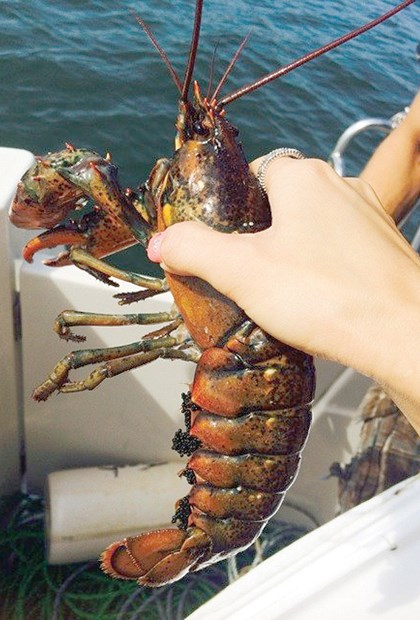An Atlantic lobster fished out of the water off Bowen Island last weekend has gone from invasive species to death row inmate and finally, celebrated research subject.
West Vancouver resident Blair Calkins found the lobster, loaded with eggs, in one of his prawn traps while taking his son fishing on Aug. 23.
Calkins and his family were unsure of what to do with Lucky, as she was named.
"We called the aquarium. They couldn't help us. They didn't want anything to do with it. We called (the Department of Fisheries and Oceans). ... DFO told me we had to kill this thing," he said. "You can understand (my son) wasn't exactly happy with that request."
After the find generated some media buzz, Chris Harley, associate professor at the University of B.C.'s zoology department, contacted Calkins offering to adopt Lucky into his lab.
"We were very pleased and happy when Chris at UBC decided he could take this on for teaching purposes so it's a happy story for everybody," Calkins said.
Especially the lobster.
Harley plans to study how native snails react when exposed to a foreign predator.
"Snails are pretty savvy about crabs. They know it's bad news when you smell a crab around and so they have a response where they climb out of the tank," Harley said. "We can see if they have the same response to the lobster or not."
Harley has done a reverse version of the study where he placed local and non-native snails into a tank with a local sea star and found only the non-native snails eaten.
"It takes some evolutionary time to recognize (trouble)," he said. "Over generations they'll evolve the ability to detect and then have the behaviours to avoid important predators.'
Harley said he's hoping another UBC researcher will attempt to hatch the eggs and research the larvae.
Marine scientists will be looking into whether there are more lobsters where Lucky came from. The B.C. government released thousands of them into the water up until the 1960s but the population never got a foothold.
"That's the interesting question. Is there a small population of lobsters now having some success in the waters around Bowen Island? Or is it just a few individuals that people have been letting go?" he said.
Harley said the second option is far more likely.
Possibilities being bandied about who might do that include animal rights activists, someone who intended to eat it and had change of heart or Buddhists who sometimes release caged animals as a religious observance.
So-called "compassionate releases" can have unintended consequences. If the animals manage to successfully breed, the species' population could explode, forcing out local species and threatening biodiversity. More likely though is the risk the animal is carrying disease or parasites than can infect local populations.
"Once you become attached to an animal or understand it or like it in some way, you want to do what's best for its welfare," he said. "You have to think compassionately about all the native species too and not just the one thing you happen to have in a tank or in a trap."



